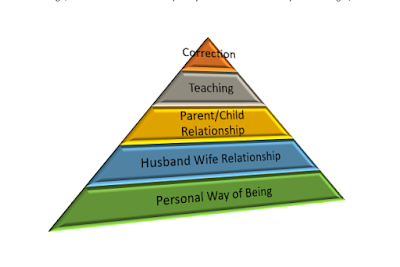The Right Way to Encourage
Children have an innate need for our approval. Young children
especially, like to see their parents smile of approval when they have done
something, they themselves are proud of. It is easy to praise children when
they have done something good. For the past few decades, parents have been
taught that praise is good and necessary for encouraging positive behaviors in
children. It is also easy to offer rewards, also known as bribes, to help
motivate children to do things that they would not normally do on their own.
These methods, however good the intentions, only serve to motivate the child
for a short period of time. According to Nelsen et al (2007), it teaches them
to rely on external judgments rather than “their internal wisdom and
self-judgment” (p. 27). In fact, the message we send to our children when we
praise is that they are not good enough if they haven’t done something great or
wonderful. It also leads them believe that they should be paid to do anything
we ask of them, even if that task is something that benefits themselves. It
feeds their sense of entitlement- a widespread concern with today’s youngsters.
Studies, such as the one in the following video, have shown that the way we praise and offer rewards to our children can greatly influence what they accomplish in their lifetime.
There’s a difference between evaluative praise and praise that
encourages. Evaluative praise uses words like: awesome, great, marvelous,
fantastic, excellent, amazing… It labels the child as smart, intelligent,
beautiful, talented and so on, and offers little by way of consolation when
they are struggling or when they make mistakes. Furthermore, it does nothing to
encourage the child to take on challenges and opportunities for growth. Rather,
in a study called “The Praise Puzzle”, it was demonstrated that evaluative
praise contributes to a fixed mindset that leads children to play it safe and
only do things that they already know they can be successful at. It puts them
in a bad situation when they make mistakes, because if they did not do well,
then it must mean that they are no longer smart, or as smart as they thought
they were.
Two other kinds of praise: descriptive praise and appreciative
praise, are more suitable to encouraging the child to value their
individuality. Descriptive praise describes the child’s effort and the result
of that effort. It makes the child feel good about themselves, helping them to
recognize that their results are directly related to their effort. Appreciative
praise couples descriptive praise together with helping the child see how his
actions affects others. These kinds of praises also help children to view
mistakes as opportunities to learn and grow rather than something to feel
ashamed of (Nelsen et al. 2007).
American author and lecturer, Alfie Kohn, challenges even praise
and rewards as something done to kids to get them to comply with our wishes. He
argues that praise manipulates children, creates praise junkies, steals a
child’s pleasure, leads to loss of interest and reduces achievement.
Consider the following alternatives:
|
Say This
|
Not That
|
|
I see you brought your Physics grade up from a D to a C. You must feel
good that the extra time you spent practicing this week is helping
|
Good
job. This is better.
|
|
I can tell
that you are proud of your accomplishment and the hard work you put into your
Spanish project. I’m glad that your teacher allowed you to bring it home like
you wanted. What do you like most about it?...
|
Great
job on your project!
|
|
Thanks for
helping your friends move. You gave up your opportunity to sleep in on such a
cold Saturday morning. I was impressed at how quickly it was all done.
|
You’re
so kind and helpful.
|
|
When I came
downstairs this morning, the first thing I noticed was that I could not smell
the litter box. I knew instantly that you followed through last night and
cleaned the litter box before going to bed. Thank you for doing that. The
room smells so much better.
|
Awesome!
You finally cleaned the litter box!
|
It is not likely that parents are going to stop praising their
children. “We are a praise-addicted culture,” says Dweck, which is why we
should practice descriptive and appreciative praise. Kohn on the other hand is
a proponent of working with kids by engaging them in conversation. More than
praise, children need feedback.
As seen in the examples above: “Providing
helpful, detailed, encouraging feedback and appreciation requires paying
attention to what kids are doing, and listening to what they are saying. This
takes time and energy.” (Santaniello).
References
Kohn, A. (2001) “Five Reasons to Stop
Saying “Good Job!” Young Children. Retrieved from https://www.alfiekohn.org/article/five-reasons-stop-saying-good-job/
MindShift. “Growth Mindset. The
Difference Between Praise and Feedback” Retrieved from https://www.kqed.org/mindshift/34778/the-difference-between-praise-and-feedback
Midwinter, A. (2016, Feb. 9). Growth
mindset and effective praise. Retrieved from https://www.youtube.com/watch?v=yct0VLJG4M8
Nelsen, J., Lott, L., & Glenn S.
2007. Positive Discipline (A-Z) 1001 Solutions to Everyday Parenting
Problems. (3rd ed.) New York: Three Rivers Press.
Pocock, J. (2017) “Are We Spoiling Our
Kids with Too Much Praise?” Education Society. Retrieved from https://daily.jstor.org/are-we-spoiling-our-kids-with-too-much-praise/
Santaniello, A. 2012. “The Praise
Puzzle: How to Motivate Kids to Be Successful.” Retrieved from https://minnesota.cbslocal.com/2012/11/15/the-praise-puzzle-how-to-motivate-kids-to-be-successful/
Taylor, J. (2009) “Parenting: Don’t
Praise Your Children! “Good Job!” is the worst kind of praise. Psychology Today.
Retrieved from https://www.psychologytoday.com/us/blog/the-power-prime/200909/parenting-dont-praise-your-children


Comments
Post a Comment